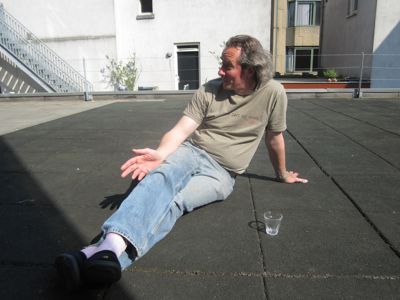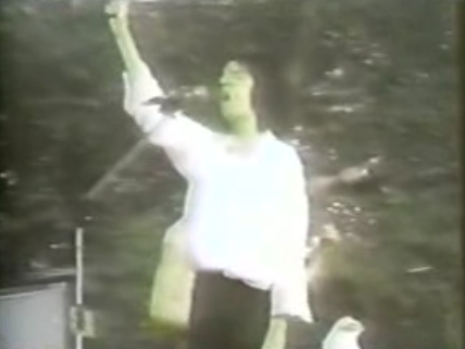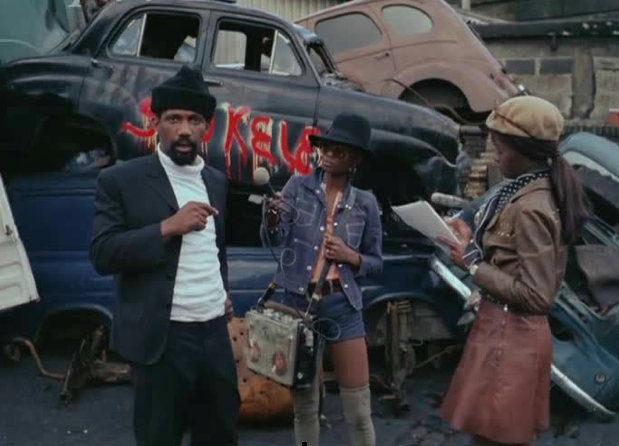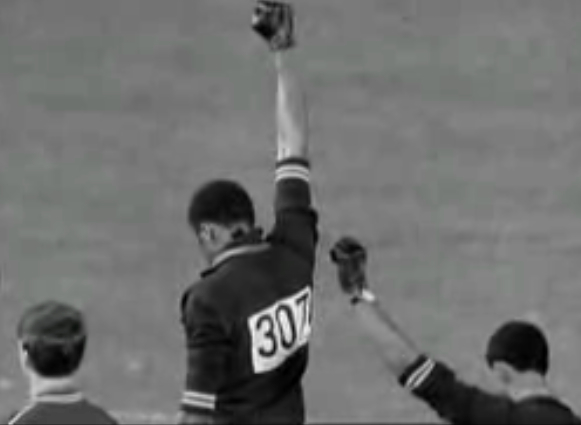This week our guest was Simon Ferdinando, a free-lance curator and writer, describing himself as a de-specialized Bricolleur (French for odd job man). He is presently pursuing a PhD at John Moores University in Liverpool. Simon organized an all-day seminar consisting of anecdotes and films touching on ideas of protest, resistance and presence. He presented themes that weave popular culture activities, sport and music or just hanging out watching movies with political ideas such as Black Power and American involvement in the Vietnam War. These films bring together (within the idea of the Space of Protest), a historical premise that both problematizes and represents the appropriation of spaces governed by the rule of rigid normalities through symbolic gestures and practical action against contemporary and historical traumas. Addressed through the works of artists, news reels, Nouvelle Vague cinema and documentary, and the recurrent presence of the Black Panthers- the militant street level activist wing of the Black Power movement- the day was a marathon with a message: History is not dead and it is still dangerous.
Beginning with Rock my Religion (Dan Graham 1984), this film offers a matrix of text, cine-footage and performance, connecting linkages through American history from the arrival of Anne Lee and her Shaker followers in the 18th Century and culminating in the dystopic ecstasy of Patti Smith. During its course Graham forms a compelling hagiographic, theoretical and biographical essay tracing a parallel history of its emergence in the USA via a particularly American sense of ecstasy that for Graham is embodied in rock ‘n’ roll.


AK Films archives of Newsreel Films vintage footage of the Black Panthers protests and rallies ‘What We Want, What We Believe’ Shows newsreel film. ‘Off the Pig’, ‘Mayday’ and ‘Repression’ highlighted not only iconic images of Angela Davis, Huey Newton and Eldridge Cleaver, but also the role of the Panthers Ten Point Plan, which proposed to tackle issues of poverty and injustice in ghetto neighbourhoods, including the famous pre-school breakfast programme. This footage offers a rare opportunity to see Black Panther protests and the visual and physical iconography of the Black Panther movement in its original context.
‘1+1’ is the Director’s cut of ‘Sympathy for the Devil’ by Jean Luc Godard (1968) an exhilaration of Godard’s political engagement as it turns toward his (so called) Maoist phase. Contemporary with the height of American Black Power movement it creates a remarkable paradoxical picture which concentrates the conflicts inherent in the period, into a remarkable series of tableaux scenes. His lyrical filmic presence interlaces these with reflections of space during the recording of ‘Sympathy for the Devil’ by the Rolling Stones.
In the later part of the 1960′s with the Vietnam war becoming a media phenomenon, sport joined art, music and popular entertainment in a newly politicized arena, in which Black athletes were making their opinions clear. The BBC documentary ‘Black Power Salute’ (Geoff Small 2008) tells the story of the members of the 1968 US Olympic sprint team. Their protest actions in support of the Black Power movement and its agenda was defined by John Carlos and Tommy Smith, in an iconic gesture. During the awards ceremony of their gold and bronze medal for the 200 meter sprint, they raised their clenched fists in a Black Power salute. Almost immediately afterwards they were kicked out of the Olympics, and the film shows the impact of the persecution from the Olympic community and the American establishent in reaction to their radical engagement. Before the days of internet and social media, the Olympic viewership was the greatest the world had ever known of any event and this action became iconic for millions of people around the world.
Taken together in the space of one day, these films developed a complex collage offering a potential for a derive, through memory, theory, politics, iconography, and gesture, whilst opening up an array of possible readings of the space of protest versus the rules of the game (Le Regle du Jeu).

